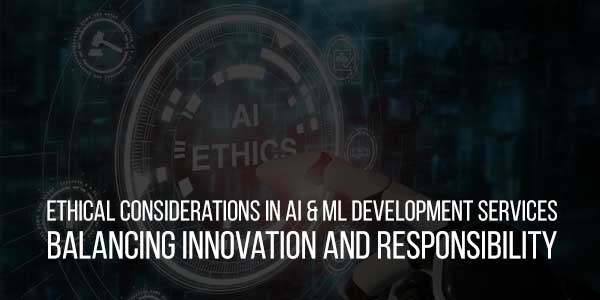
In technology, Artificial Intelligence (AI) and Machine Learning (ML) development services are at the forefront of innovation that revolutionizes industries, from healthcare to finance, by automating processes, enhancing decision-making, and unlocking new possibilities. However, with great innovation comes great responsibility.
Ethical considerations in AI & ML development are crucial. According to a recent survey by PwC, 85% of CEOs believe that AI will significantly change the way they do business in the next five years. With such widespread adoption, ensuring that AI systems are developed and deployed ethically is paramount.
In this article, we explore the importance of ethical frameworks in AI development, the role of developers, as well as strategies for responsible innovation in AI and ML.
Table of Contents
Understanding Ethical Concerns In AI & ML:
Artificial Intelligence (AI) and Machine Learning (ML) technologies are revolutionizing industries and society, but they also bring ethical challenges that must be carefully considered. Here’s a closer look at some of the key ethical concerns:
1.) Bias In AI Algorithms:
AI algorithms are only as unbiased as the data they are trained on. If the training data is biased, the algorithm can perpetuate and even exacerbate these biases. For example, an AI algorithm used in hiring may discriminate against certain demographic groups if the training data is not diverse enough. Addressing bias in AI algorithms requires careful selection and curation of training data, as well as regular audits to identify and mitigate bias.
2.) Privacy And Data Security Issues:
AI systems often rely on lots of amounts of data, including personal information which raises concerns about data privacy and security. Unauthorized access to this data can lead to identity theft, financial fraud, and other serious consequences. so It’s essential to implement robust data protection measures, such as encryption and access controls, to protect user data from unauthorized access and misuse.
3.) Potential For Misuse Of AI Technology:
AI technologies are used for both beneficial and harmful purposes. For example, while AI-powered chatbots can improve customer service, they can also be used to spread disinformation or manipulate public opinion. So Before the use of AI technology, it required clear guidelines and oversight to prevent misuse and abuse.
4.) Impact On Society And Job Displacement:
The widespread adoption of AI and automation technologies has the potential to disrupt industries and lead to job displacement. While AI can create new opportunities and improve efficiency, it can also eliminate certain types of jobs. Ethical considerations include ensuring a just transition for workers affected by automation and addressing the broader societal impacts of job displacement.

What Are The Current Ethical Frameworks And Guidelines?
Several ethical frameworks and guidelines exist for AI and ML development:
- IEEE Ethically Aligned Design (EAD): Focuses on transparency, accountability, and inclusivity in autonomous systems. It’s widely adopted and effective.
- ACM Code of Ethics: Outlines responsibilities for computing professionals, including privacy, accuracy, and harm avoidance. It provides a useful framework but may vary in addressing AI-specific concerns.
- EU Guidelines for Trustworthy AI: Emphasizes human oversight, technical robustness, and privacy. Effective for promoting ethical AI but mainly applicable in EU member states.
How Can We Balance Innovation And Responsibility In AI & ML Development?
Balancing innovation and responsibility in AI & ML development requires a thoughtful approach that integrates ethical considerations, prioritizes transparency and accountability, and fosters collaboration among stakeholders.
One key strategy to integrate ethical considerations into AI & ML development is to embed ethics into the design process from the outset. In which involves identifying potential ethical issues and addressing them proactively during the development phase along with ensuring that development teams are diverse and inclusive can help identify and address potential biases in AI systems.
Transparency and accountability are also important in AI projects to build trust with users and stakeholders which is achieved by Being transparent about how AI systems make decisions and what data they use can help ensure that AI technologies are developed and deployed responsibly.
Collaborative efforts between developers, policymakers, and ethicists are required. Engaging with a wide range of stakeholders can help to ensure that ethical considerations are properly integrated into AI development and AI technologies are aligned with societal values.
What Are The Responsibilities Of Developers In Ensuring Ethical AI & ML Practices?
As the architects behind AI and ML innovations, developers bear significant responsibility in ensuring that these technologies are developed and deployed ethically. Their responsibilities encompass a range of crucial tasks:
- Ensuring Ethical AI & ML Practices: Developers must be vigilant in identifying and mitigating biases in AI algorithms. For example, in a hiring algorithm, developers need to ensure that the algorithm does not discriminate against certain demographic groups. this is achieved by regularly auditing the algorithm and adjusting the model to improve fairness.
- Promoting Transparency and Accountability: Developers should strive to make AI systems transparent and accountable which means being transparent about how AI systems make decisions and what data they use. For example, developers can provide users with access to an explanation of how the AI system arrived at a particular decision enabling them to understand and trust the technology better.
- Ensuring Data Privacy and Security: Developers need to prioritize data privacy and security in AI development that involves implementing robust data protection measures, such as encryption and access controls, to safeguard user data also developers should be aware of potential privacy risks and take steps to mitigate them.
- Advocating for Ethical AI Practices: Developers should advocate for ethical AI practices within their organizations and the broader AI community Which includes raising awareness about the importance of ethics in AI development and promoting best practices for ethical AI design.
Conclusion:
In summary, it’s crucial for developers and others involved to prioritize ethics in AI & ML development which is possible by working together and following ethical standards so we can ensure that technologies benefit society without causing harm. Let’s all commit to ethical AI & ML practices, creating a future where technology serves humanity responsibly.

 About the Author:
About the Author:











Be the first to write a comment.